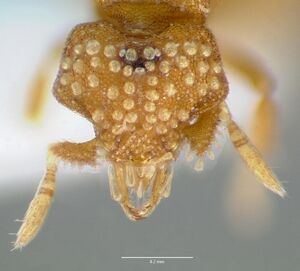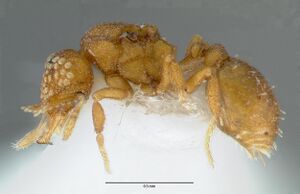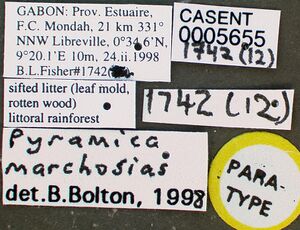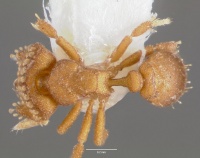Strumigenys marchosias
| Strumigenys marchosias | |
|---|---|

| |
| Scientific classification | |
| Kingdom: | Animalia |
| Phylum: | Arthropoda |
| Class: | Insecta |
| Order: | Hymenoptera |
| Family: | Formicidae |
| Subfamily: | Myrmicinae |
| Tribe: | Attini |
| Genus: | Strumigenys |
| Species: | S. marchosias |
| Binomial name | |
| Strumigenys marchosias (Bolton, 2000) | |
This species has been collected from rainforest and includes samples taken from under a stone and sifted litter.
Identification
Bolton (2000) - A member of the laticeps complex in the Strumigenys argiola group. At first glance this species closely resembles Strumigenys tiglath, but in that species the mandible has only a single small preapical tooth, the proximal flattened hair on the mandible dorsum arises at about the midlength of the mandible and the outer strap-like hair on the anterior clypeal margin is no more than 0.50 X ML. In addition, the apicodorsal tooth of tiglath is obviously not spiniform.
Keys including this Species
Distribution
Latitudinal Distribution Pattern
Latitudinal Range: 0.56833° to 0.56833°.
| North Temperate |
North Subtropical |
Tropical | South Subtropical |
South Temperate |
- Source: AntMaps
Distribution based on Regional Taxon Lists
Afrotropical Region: Central African Republic, Gabon (type locality).
Distribution based on AntMaps
Distribution based on AntWeb specimens
Check data from AntWeb
Countries Occupied
| Number of countries occupied by this species based on AntWiki Regional Taxon Lists. In general, fewer countries occupied indicates a narrower range, while more countries indicates a more widespread species. |

|
Estimated Abundance
| Relative abundance based on number of AntMaps records per species (this species within the purple bar). Fewer records (to the left) indicates a less abundant/encountered species while more records (to the right) indicates more abundant/encountered species. |

|
Biology
Castes
Queen
Images from AntWeb
   
| |
| Paratype of Strumigenys marchosias. Queen (alate/dealate). Specimen code casent0005655. Photographer April Nobile, uploaded by California Academy of Sciences. | Owned by CAS, San Francisco, CA, USA. |
Nomenclature
The following information is derived from Barry Bolton's Online Catalogue of the Ants of the World.
- marchosias. Pyramica marchosias Bolton, 2000: 290 (w.q.) GABON. Combination in Strumigenys: Baroni Urbani & De Andrade, 2007: 123
Unless otherwise noted the text for the remainder of this section is reported from the publication that includes the original description.
Description
Worker
Holotype. TL 1.7, HL 0.43, HW 0.51, CI 119, ML 0.18, MI 41, SL 0.22, SI 43, PW 0.32, AL 0.48. Apicodorsal tooth of mandible spiniform but relatively short, only as long as, or fractionally longer than, the apicoventral tooth. Mandible with 2 small preapical teeth, both in the apical quarter; distal preapical tooth very close to apicodorsal tooth. Dorsal surface of mandible with 2 flattened hairs, located in the apical third of the length; these hairs project over the preapical teeth and partially conceal them in full-face view. Proximal flattened hair on each mandible arises well into the apical half of the mandible length. Anterior clypeal margin with 4 broad long strap-like hairs that project anteriorly, the outer pair > 0.50 X ML and longer than the inner pair. Cephalic dorsum with large orbicular hairs present from posterior clypeal margin to close to occipital margin. With alitrunk in profile dorsal outline of mesonotum not raised posteriorly into a convex hump.
Paratypes. TL 1.5-1.7, HL 0.37-0.42, HW 0.45-0.51, CI 119-125, ML 0.14-0.18, MI 40-45, SL 0.19-0.22, SI 40-43, PW 0.27-0.32, AL 0.40-0.46 (4 measured).
Type Material
Holotype worker, Gabon: Provo Woleu-Ntem, 31.3 km. 108° ESE Minvoul, 2°04.8' N, 12°24.4'E, 600 m., 1l.ii.1998, #1684(47) (B.L. Fisher) (The Natural History Museum).
Paratypes. 2 workers with same data as holotype but samples #1684 (7 and 22); 2 workers and 1 queen (dealate), Gabon: Provo Estuaire, F.C. Mondah, 21 km. 331° NNW Libreville, 0034.6'N, 9°20.1'E, 10 m., 24.ii.1998, #1742 (sample numbers 12, 28, and 29), sifted litter (leaf mold, rotten wood) , littoral rainforest (B.L. Fisher) (BMNH, Museum of Comparative Zoology, South African Museum, coll. Fisher).
References
- Baroni Urbani, C. & De Andrade, M.L. 2007. The ant tribe Dacetini: limits and constituent genera, with descriptions of new species. Annali del Museo Civico di Storia Naturale “G. Doria”. 99:1-191.
- Bolton, B. 2000. The ant tribe Dacetini. Memoirs of the American Entomological Institute. 65:1-1028. (page 290, worker described)
References based on Global Ant Biodiversity Informatics
- Bolton, B. 2000. The Ant Tribe Dacetini. Memoirs of the American Entomological Institute 65

